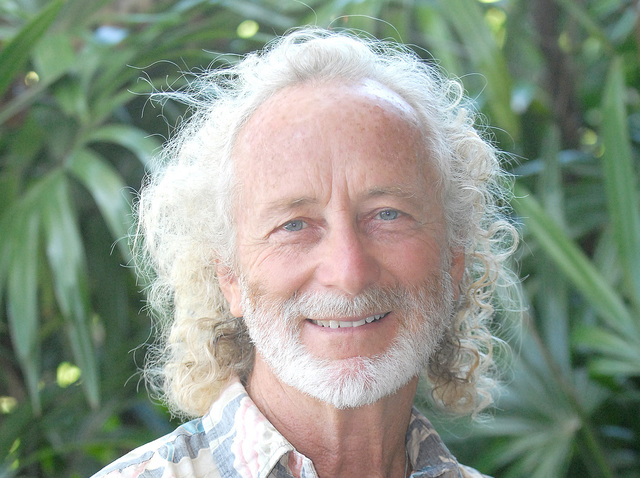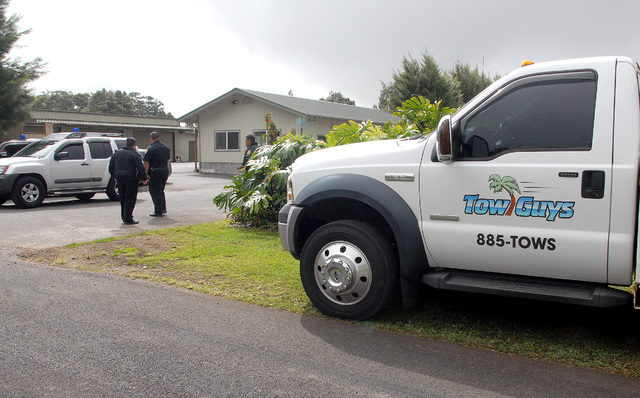Officials say suspicious device not explosive, vehicle owner says it was water fuel cell
KAILUA-KONA — Police continue to investigate a “suspicious device” found on a vehicle in a Waimea tow yard Tuesday morning, but ruled that it wasn’t an explosive.
“All I can say is that it was determined that it could not be an explosive device in its current form,” police Capt. Randall
Medeiros said.
The investigation is ongoing, but the tow yard owner said it appeared to be a dummy bomb, intended to look like a real one.
The owner of the vehicle disputes that.
William Gilroy, of Captain Cook, who owns the car that police pulled over before impounding it on Saturday, said the device was a simple a water fuel cell, a system to improve gas mileage by mixing fuel and water.
“If I’m a bomber, why hasn’t the FBI contacted me?” said Gilroy, who visited West Hawaii Today Wednesday on the day a story ran about police and bomb experts investigating a possible explosive in Waimea, which prompted a tow yard to be evacuated.
Gilroy said he was confused by the whole ordeal and didn’t understand why officials would suspect a bomb. He talked about the chain of events that has put him in fear of his life.
He said the incident began on Saturday along Saddle Road during “Freedom Ride 2016,” when people drove cars without plates or safety stickers. If it’s not a commercial vehicle, the groups says, people do not need registration and other materials listed in state law.
Gilroy said he was driving his car, which had a fluorescent “no trespassing sign” mounted where other vehicles have a plate, when a police officer was following him along Saddle Road near Mauna Kea State Park and signalled him to pull over.
He had his passenger call 911 to confirm it was an officer, as the vehicle was not marked. With the number of police shootings of residents, he was concerned for his safety, he said. He added he slowed to move over in an attempt to find a safe place to stop, but the officer got in front of him and slammed on his brakes, forcing him to stop.
Gilroy said the officer started screaming numerous instructions, including to put their hands up and turn off the car, but the two were stunned by the maneuver and aggressive behavior and were slow to respond, he said.
That led to the officer drawing his handgun and pointing it at both people, Gilroy said.
“I really thought he was going to shoot me, actually,” he said.
The officer returned the pistol to its holster and approached Gilroy’s door, opened it, reached across Gilroy’s body, striking him in the chest as he did so, Gilroy said, then took the keys from the ignition and slammed the door, which left the car in the middle of a lane on Saddle Road.
“I haven’t committed a crime,” Gilroy said, adding that he was confused by the stop and alarmed by the drawn weapon.
Police have said that traffic laws about plates, stickers and licenses apply to all motorists and stated their stances more than one time prior to Saturday’s well publicized Freedom Ride.
Gilroy for some time refused to provide an ID on grounds, he said, he didn’t commit a crime, but eventually provided one from the Kingdom of Hawaii. It’s not a form of identification recognized by the state.
Gilroy was not arrested, although the car was towed the vehicle under Aliyah’s Law, a county statute that allows police to tow cars of people driving without a state license and in other situations.
“In essence, what they did was stole his car,” said Paul Komara, one of the group’s organizers.
A complaint has been filed on behalf of Gilroy. Police have said they received the complaint, which has been forwarded to the chief’s office, but didn’t comment further.
Komara said the point of the effort was to show that a unified group of people will not be abused by their government. He said that the event was a violation of Gilroy’s rights and there would be legal action against the towing company and law enforcement.
This all all led to the vehicle moving to the impound lot.
Tow Guys owner, David McCullough, told West Hawaii Today he saw the device after a call from the vehicle owner, Gilroy, saying he should examine the front end. He found what he thought was a bomb and called police.
Gilroy disputes that. He said he called to ask who the person was that towed his vehicle, as that person could be subject to fines. The vehicle was marked as private property and included signage that moving it would incur a $10,000 fine. He hung up the phone because the tow owner seemed very upset.
As for the water fuel cell, it was disconnected at the time, Gilroy added.
The tow truck driver had originally believed that, McCullough said, but his discovery of wires and a toggle switch to the battery changed his mind.
Members of the Hawaii Police Department, FBI, ATF and Army responded to the scene. The closed off the area in the afternoon and the investigation stretched into the evening.
Medeiros said that the officers may contact Gilroy during the course of the investigation, but their immediate concern was with the device itself on Tuesday.
Four explosive ordinance disposal soldiers from the 303rd Ordinance Battalion were sent to the scene from Oahu, said Major Leslie Waddle.
A spokesman for the ATF said that if the device was determined to be an attempt to look like a bomb, there is the possibility of federal charges.
The vehicle was taken by police to their impound lot for continued investigation.
McCullough said things were “as back to normal as can be” at the lot.
“As a result of this incident, approximately 12 homes and their 21 occupants in the Nani Waimea subdivision were displaced while personnel worked to identify and safely disassemble the suspicious device. Police apologize for the inconvenience caused to those residents but, given the circumstances, it was the prudent thing to do,” the department wrote in a press release.
But Komara said this whole incident was an example of the United States becoming a police state. Both he and Gilroy said a lawsuit could be coming, although Gilroy said he didn’t have legal representation. He said he feels targeted by law enforcement.
“We the people are the government,” Komara said. “These people are our trusted servants.”




